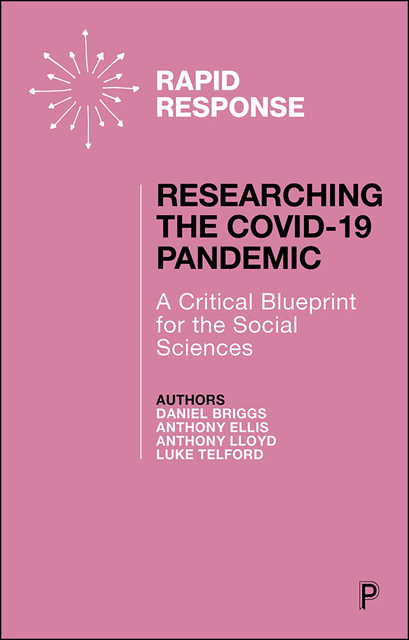Book contents
- Frontmatter
- Dedication
- Contents
- List of figures and tables
- Acknowledgements
- Foreword
- 1 Apocalypse then: The world pre-COVID-19 and the state of the social sciences
- 2 Viral Armageddon: The spread and impact of COVID-19
- 3 Apocalypse now: The (desk-based) scramble for knowledge
- 4 Studying the COVID-19 pandemic as it happens
- 5 Apocalyptic futures: An appeal to the social sciences
- Notes
- References
4 - Studying the COVID-19 pandemic as it happens
Published online by Cambridge University Press: 15 April 2023
- Frontmatter
- Dedication
- Contents
- List of figures and tables
- Acknowledgements
- Foreword
- 1 Apocalypse then: The world pre-COVID-19 and the state of the social sciences
- 2 Viral Armageddon: The spread and impact of COVID-19
- 3 Apocalypse now: The (desk-based) scramble for knowledge
- 4 Studying the COVID-19 pandemic as it happens
- 5 Apocalyptic futures: An appeal to the social sciences
- Notes
- References
Summary
As Rhodes and Lancaster (2020: 177) highlight, ‘public health emergencies are rarely studied as they happen. But they should be’, and this is what we have tried to do: document what is happening at each stage of the evolving pandemic. Though ambitious in its design, we wanted to find out how this was affecting citizens globally to consider how the pandemic was – and still is – not only exacerbating neoliberalism's existing inequalities, but potentially reshaping society's political, economic and social institutions as well as our subjective outlooks. There was no time to wait for a funding call and continue along further bureaucratic pathways should project finance emerge. We are experienced researchers who were faced with a unique opportunity to research the most significant event so far of the 21st century and had to act quickly. Therefore, we wasted no time in devising our research tools and immediately set about our study.
Studying the ‘here and now’: the aims and methods of the Project
The aims of this study were to understand people's experiences of this unique global event and to chart how COVID-19 is reshaping social life and society. To do this, it adopted a flexible inductive approach which allocated different research methods to consider what we identify as three stages in the development of the pandemic. The initial stage examined the first lockdown experienced by over 100 countries. This was followed by the emergence of what was broadly termed by global entities – and in tandem with the World Health Organization (WHO) – as the ‘new normal’, where measures
such as self-isolation, social distancing and masks begin to dominate social life. As the ‘new normal’ was generally embraced or rejected, we then arguably entered a period of uncertainty marked by what many governmental scientists termed as the advent of the ‘second wave’. In some countries like the UK and US, commentators suggested this then became a ‘third wave’ and billions were invested in potential vaccines.
Given that there were significant limitations on where we could go as researchers due to the restrictions placed upon us, we had to be creative with the methods we employed (see Table 1).
Phase 1 documented the experience of the first ‘lockdown’ enacted in over 100 countries worldwide which, between January and May 2020, went into either partial, local or national lockdown.
- Type
- Chapter
- Information
- Researching the COVID-19 PandemicA Critical Blueprint for the Social Sciences, pp. 51 - 106Publisher: Bristol University PressFirst published in: 2023



